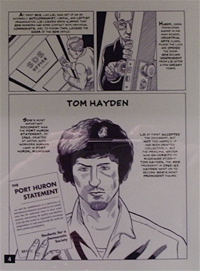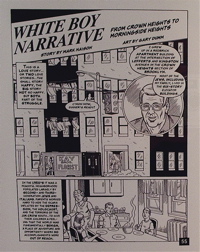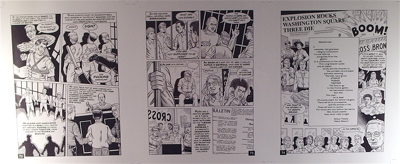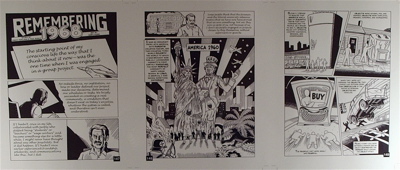!['Students for a Democratic Society, A Graphic History' by Harvey Pekar (author), Paul Buhle (editor), Gary Dumm (illustrator) [Hill and Wang]](http://www.artsjournal.com/herman/SDS%20Graphic%20History%20200.jpg) Who knew? I didn’t. But that’s what Tom Hayden reveals, give or take a few details, in a blurb for “Students for a Democratic Society, A Graphic History,” a new book due out in January from Hill and Wang. “My own radical journey began with Mad Magazine,” he says, “so it feels great that SDS should enter the culture of comic folklore …”
Who knew? I didn’t. But that’s what Tom Hayden reveals, give or take a few details, in a blurb for “Students for a Democratic Society, A Graphic History,” a new book due out in January from Hill and Wang. “My own radical journey began with Mad Magazine,” he says, “so it feels great that SDS should enter the culture of comic folklore …”
OK, it’s only a blurb. But I believe him. And in one of those perfect coincidences that border on the paranormal, Harvey Pekar and Paul Buhle, who collaborated on the book with others, will discuss comics and politics at The Graduate Center, CUNY, on Monday — Dec. 10 — which also marks International Human Rights Day and the culmination of this year’s Amnesty International Global Write-a-Thon.
Pekar is best known for his comic book series “American Splendor.” He’s also the subject of the movie documentary with the same title. Buhle was the founding editor of the 1960s SDS magazine Radical America. They’ll be joined in a panel discusion by Jeff Jones, an environmental activist who was a former SDS officer and one of the founders of the Weather Underground. Hayden won’t be there, hélas.
(Crossposted at HuffPo)
 Since Buhle and Pekar will be, here’s some of what they say in the introduction to their graphic history:
Since Buhle and Pekar will be, here’s some of what they say in the introduction to their graphic history:
[The book] is, finally, a series of stories from the life of a generation, ending where SDS peaked, at around eighty to a hundred thousand activists and followers. So much had happened so quickly around them, it was no surprise that many young radicals and quite a few conservatives imagined American society to be on the verge of some vast transformation. A significant chunk of SDSers joined and in some cases actually organized the women’s liberation movement, the gay and lesbian movements, the environmental movement, and so on. These causes, still far from won almost a half century later, had been essentially invisible before the era of SDS. It is difficult for today’s young people to conceptualize a society at once so self-satisfied and so deep in social conservatism, race sentiment, homophobia, environmental indifference, and the assumptions of fixed roles of the sexes, and just as difficult to imagine that all these issues were tackled almost simultaneously, and very largely by the young themselves.
Can’t make it to the panel discussion? How about the SDS Comic Show? It’s a traveling exhibit of all the graphics from the book, and free, too, in the Graduate Center lobby. Just walk in any time.
 Wanna read more? Here’s another excerpt from the intro (on view at the exhibit):
Wanna read more? Here’s another excerpt from the intro (on view at the exhibit):
The Vietnam War was, of course, the central political issue of Students for a Democratic Society, as inevitable as its locus on the nation’s campuses. The mystery of the rebellion unraveled in this book is that SDS and all its energies never resembled the specter that so many in powerful places and in lonely living rooms feared and pondered. If, according to polls conducted among them, a large segment of the student population considered itself somehow “revolutionary” by the peak years of 1968-70, it was not in the name of any revolution that had existed or would exist, perhaps any that could exist.
Some more samples from the exhibit and intro:
In our twenty-first century, the perspective has, of course, become very different. Not because the doddering radical veterans of that era have lived through so many years (and tears, and beers) and still remain part of the largest population bubble. Not because the structure of American society has changed in any fundamental way. Rather, it has to do with the sobering fact that just as the sixties generation is itself entering old age, its hard-won lessons seem to have reappeared.

Today the Empire has badly overreached again. Our political elite is once again in disarray. The current Iraqi conflict, raising the voices of the powerful against each other as never since the sixties, exposes the flawed logic of Empire. However different the nation has become in forty years, creativity still arguably blossoms best among youth, those who have the least stake in the existing rules of society.
The reasons that the 1960’s have never quite gone out of common perspective is that the music, the cartoons and comics, the posters, the impulses, and the fears did not actually get old with the people who first lived them. The idea that any little group of saviors, self-avowed Weathermen or dogmatic Marxists, would lead America or the world into the promised land is over. Everyone in the Wal-Mart Nation knows better. But the crises didn’t really go away, any more than did the urgent need and the simultaneous improbability of an inspired mass awakening to a better, more ecologically sound, more peaceful and cooperative, Age of Aquarius-like future.
You could spend a couple of hours just looking and reading. And shaking your head up, down and sideways.

